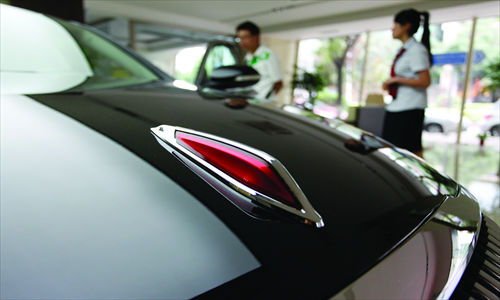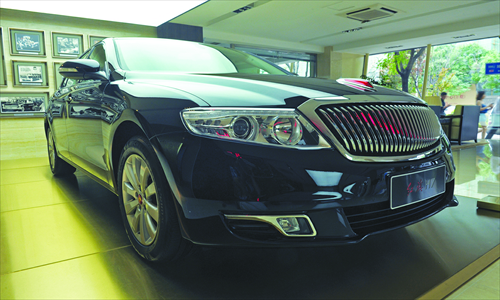HOME >> BUSINESS
Local appeal
By Chen Dujuan Source:Global Times Published: 2013-6-26 23:13:01

The logo of homegrown auto brand Hongqi, which literally means "red flag". Photo: CFP

The newly released Hongqi H7.Photo: CFP
Beijing-based auto producer BAIC Motor has recently sold more than 100 Senova cars to several Beijing government agencies as well as the municipal Party committee, Beijing News reported Sunday.
The homegrown auto brand, which was launched in May, said it was aiming mainly at government procurement.
It represents more good news for domestic auto brands, following reports on May 17 that Chinese Foreign Minister Wang Yi had changed his official vehicle to a Hongqi H7 sedan.
Boosted by rising government orders, China's homegrown auto brands are hoping to seize a bigger share of the government market.
Intensified competition
China FAW Group, producer of the Hongqi brand, officially launched the Hongqi H7 on May 30, priced from 299,800 yuan ($48,778) to 479,800 yuan. The car was designed to target ministerial-level officials and the high-end market.
FAW has invested 5.2 billion yuan so far in a program initiated in 2008 to revive its Hongqi brand, said FAW Chairman Xu Jianyi.
The company also made a plan to invest 10.5 billion yuan between 2011 and 2015 in enhancing R&D capacity and broadening the Hongqi product line, Xu said.
The brand, which means "red flag," was used by top Chinese government officials for important occasions from 1959 to the early 1980s. It was also the vehicle used to receive the then US President Richard Nixon during his visit to China in 1972.
But in recent years the government market has been dominated by foreign brands.
FAW has tried to promote Hongqi at political events, such as receiving French President Francois Hollande with a Hongqi car during his state visit to China in April and offering a Hongqi car for the visit of Palestinian President Mahmoud Abbas in May.
Zhang Xiaojun, general manager of FAW Car Sales Company, said at the end of May that the company sold 1,000 H7 cars in the first five months of the year, all of them sold to government bodies.
Other brands have also made moves to gain a share of the government market. SAIC Group got an order for 150 Roewe cars from the General Administration of Customs earlier this month, but didn't reveal the total value of the deal. The brand was also used for the media during the country's annual legislative and advisory two sessions in March.
Government orders from the group increased 109 percent in 2012 compared with 2011 and the number is expected to grow by 115 percent year-on-year in 2013, China Business News reported on June 18.
BYD Co has offered an E6 electric car for use by Shenzhen Party chief Wang Rong and Minister of Science and Technology Wan Gang.
Homegrown cars have traditionally focused on the low-end market, due to relatively modest technologies and competition from foreign brands, and their profits account for only 5 percent in the domestic market, even though they have a 30 percent market share, said Zeng Zhiling, director of LMC Automotive Asia Pacific Forecasting.
Government support could push them to move toward the middle and high-end markets, Zeng said.
There is intense competition in the market for official cars, so domestic brands need to seek ways to stand out, but it is also important for these companies to boost the image of domestic brands, Cui Dongshu, deputy secretary-general of the National Passenger Car Association, told the Global Times Tuesday.
Reform launched
In a speech in December 2012, Chinese President Xi Jinping called on officials to gradually shift toward using domestic car brands.
Xi also noted in January that all Party organs and members should be frugal, which was seen as an indication that the government would buy more affordable domestic cars.
The list of approved auto brands released by the Ministry of Industry and Information Technology in 2012 required government agencies to use domestic vehicles when making new purchases.
Local governments such as Anhui and Hunan provinces also released policies in recent months to support the purchase of domestic cars.
However, the government auto market is still dominated by foreign brands such as Audi, with homegrown brands accounting for only 10 percent, Zeng said.
The push for government procurement of domestic cars has not been carried forward as quickly as expected, said Su Hui, an analyst at the China Automobile Dealers Association.
The government is also set to reduce the amount of official cars it uses, so domestic brands should not put too much effort into the government market, Su said.
Sales to individuals too
Government procurement is still only a small part of the total auto market, with sales amounting to just 200,000 to 300,000 units each year, said Du Fangci, assistant secretary-general of the China Association of Automobile Manufacturers. This figure is around 2 percent of total annual auto sales.
However, general sales of domestic auto brands could be boosted by increasing government orders, because of the psychological effect on domestic consumers, Cui said.
"In the past, people thought it would be a loss of face to drive a domestic car, but domestic brands will gradually have bigger influence because of government support, and individual consumers will pay more attention to these brands," he noted.
However, homegrown brands are still far from satisfying consumers' diversified demands, Du said.
Hongqi has opened stores for sales to individual consumers in nine cities, including Beijing, Shanghai and Guangzhou, with another 12 to be built in other cities.
A salesperson at the new Hongqi store in Jinan, East China's Shandong Province, told the Global Times Tuesday on condition of anonymity that sales of the Hongqi H7 have been on the rise since the opening of the store, and buyers have included individuals as well as government agencies and enterprises.
The Beijing store sold more than 20 Hongqi H7 sedans from May 30 to June 18, half of which were to individuals and the rest to State-owned enterprises and government departments, China Business Journal reported Monday.
Before launching the H7, FAW only sold two Hongqi cars in 2011 and 127 units in 2012, according to Guosen Securities.
Lan Hulin, a Beijing resident in his 40s who plans to buy a car, said he would not choose domestic brands at present due to their relatively low technology.
"When domestic cars have technologies as advanced as foreign rivals, just as domestic home appliances do, consumers will definitely choose domestic cars," Lan said.
Liang Jialing contributed to the story.
Posted in: Insight